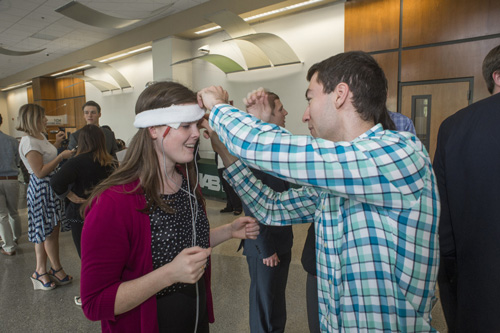Program Educational Objectives and Student Outcomes
The Bachelor of Science in Biomedical Engineering degree program is accredited by the Engineering Accreditation Commission of ABET, https://www.abet.org, under the commission’s General Criteria and Program Criteria for Bioengineering and Biomedical and Similarly Named Engineering Programs.
Program Goals
- Deliver high quality biomedical engineering education.
- Prepare students to take their place in globally competitive technical environment.
- Educate students who can compete in new and emerging technologies and markets by teaching them problem-solving skills including: critical thinking, strategic planning, effective communication, awareness of societal and ethical issues in engineering and medicine, and awareness of the need for life-long learning.
- Provide exemplary service for the benefit of the University, the Birmingham metropolitan community, the State of Alabama, business and industrial organizations, and the engineering professional.
 Student demonstrating his design at the UAB Biomedical Engineering (BME) Research Symposium Poster Session.
Student demonstrating his design at the UAB Biomedical Engineering (BME) Research Symposium Poster Session.
Educational Objectives
Three to five years after graduation, graduates of the Biomedical Engineering undergraduate program will have:
- gained admission to graduate or professional school, or employment in engineering and/or health related professions, and
- pursued opportunities for professional growth, development, and service.
Student Outcomes
Upon completion of the BS in Biomedical Engineering degree program, our graduates will have:
- an ability to identify, formulate, and solve complex engineering problems by applying principles of engineering, science, and mathematics
- an ability to apply engineering design to produce solutions that meet specified needs with consideration of public health, safety, and welfare, as well as global, cultural, social, environmental, and economic factors
- an ability to communicate effectively with a range of audiences
- an ability to recognize ethical and professional responsibilities in engineering situations and make informed judgments, which must consider the impact of engineering solutions in global, economic, environmental, and societal contexts
- an ability to function effectively on a team whose members together provide leadership, create a collaborative and inclusive environment, establish goals, plan tasks, and meet objectives
- an ability to develop and conduct appropriate experimentation, analyze and interpret data, and use engineering judgment to draw conclusions
- an ability to acquire and apply new knowledge as needed, using appropriate learning strategies.
Program Criteria for Biomedical Engineering
The structure of the curriculum must provide both breadth and depth across the range of engineering topics implied by the title of the program. The program (curriculum) must prepare graduates:
- to have an understanding of biology and physiology, and the capability to apply advanced mathematics (including differential equations and statistics), science, and engineering to solve the problems at the interface of engineering and biology;
- with the ability to make measurements on and interpret data from living systems, addressing the problems associated with the interaction between living and non-living materials and systems.